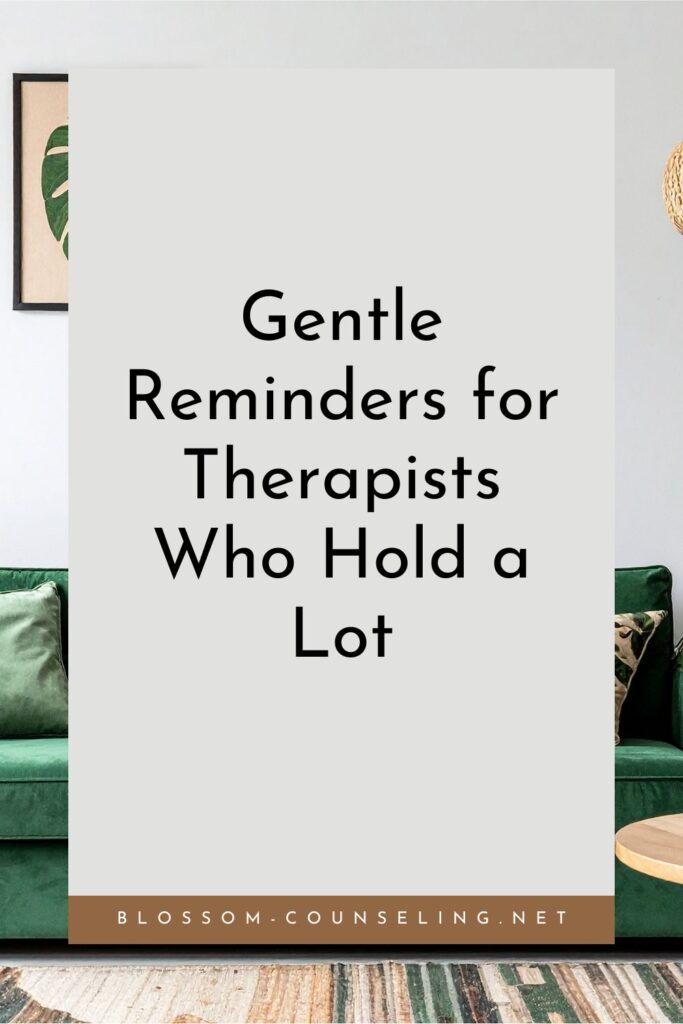
Therapists hold space all day long. We listen closely. We regulate our own nervous systems while helping others regulate theirs. We show up with empathy, curiosity, and presence, sometimes session after session without much of a pause. We are trained to sit with pain, resistance, growth, and those beautiful moments of insight.
And still, we are human.
Even with years of training and experience, there are moments when we need reminders rather than new tools. Something gentle. Something grounding. Whether you are just starting out or have been doing this work for years, these reminders are here to support you.
You Are Not Your Client’s Progress
It can be easy to tie your sense of competence to how your clients are doing. When a client feels lighter or makes a big shift, it feels affirming. When a client feels stuck, disengaged, or overwhelmed, it can stir up self doubt.
Healing is not linear, and it is not a report card on you. Your role is to show up with care, attunement, and integrity. You cannot control outcomes, and you are not meant to. Progress unfolds in its own time.
You Do Not Need the Perfect Response
There is a quiet pressure in this work to say the exact right thing at the exact right moment. In reality, therapy is not about perfect words. Some of the most meaningful moments come from pausing, being curious, or saying, “I’m not sure, but let’s think about that together.”
Presence matters more than polish. Repair and honesty build trust in ways scripts never could.
Your Nervous System Matters Too
Burnout, compassion fatigue, and vicarious trauma do not always arrive loudly. Sometimes they show up as tension in your body, shortened patience, or a sense of heaviness before the workweek begins.
Your nervous system is one of your most important tools. Rest is not a luxury. It is part of doing this work sustainably.
Not Every Session Has to Feel Big
Some sessions feel expansive and energizing. Others feel quiet, repetitive, or slow. Both matter. Consistent presence, even when nothing dramatic happens, is powerful.
Clients often benefit deeply from the steadiness of being met again and again, even when they cannot name it yet.
Connection Is Important and Boundaries Matter
The therapeutic relationship is meaningful, and the boundaries that hold it are what make it safe. You are not your client’s friend, and that is not a failure of connection. The structure of the relationship allows clients to do the work without relying on you in ways that are not sustainable.
Boundaries protect both you and the client.
It Is Okay to Have Preferences and Stay Flexible
It makes sense to have approaches that feel natural or energizing to you. At the same time, therapy is not one size fits all. Clients are not worksheets, and healing does not always follow a plan.
Flexibility is part of the art of this work.
Consultation Is Part of Ethical Care
Support is not just for interns. Talking things through with other clinicians can offer clarity, perspective, and relief. Sometimes naming a concern out loud is enough to loosen its grip.
Community helps us care more ethically and more humanely.
You Do Not Have to Know Everything
No one holds every theory, diagnosis, or niche issue at all times. It is okay to look things up. It is okay to ask colleagues. It is okay to say you will follow up.
Curiosity keeps this work alive.
A Final Reminder
These reminders are not signs that you are doing something wrong. They are signs that you are human, doing deeply human work. In the sessions that feel messy, the seasons that feel heavy, and the moments where you feel disconnected from your purpose, you deserve care too.
Therapists are not just clinicians. We are whole people. And that matters.
Hi, I’m Shereece, a therapist who believes you don’t need to have everything figured out to start feeling better. I support young adults, adults, teens, and families through life transitions, anxiety, trauma, and those moments when everything just feels like too much.
If you’re feeling overwhelmed, stuck, or ready for something to shift, therapy can be a place to breathe, reflect, and begin again. I’d be honored to walk that path with you.




